
Book Now to Experience
Acne Treatment
1 Minute Self-Registration
Date should not be before minimal date
Author: Leila Tan|Updated: 23 July 2024
Hyperpigmentation is a common skin disease in which patches of skin get darker or a different colour. It can be caused by things like too much sun, changes in hormones, and reactions to inflammation. In this post, we'll talk about the best products that can help you get rid of hyperpigmentation and have clearer, more even skin!

1
What Causes Hyperpigmentation?
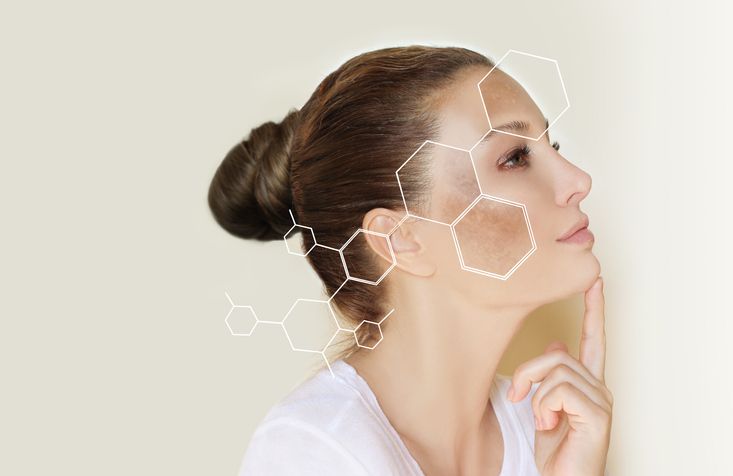
There are many things that can cause hyperpigmentation. Sun exposure and damage from UV rays are the main reasons why the skin makes too much melanin. Melasma is a type of redness that can be caused by changes in hormones, like those that happen during pregnancy or when you take birth control pills and post-inflammatory hyperpigmentation (PIH) can also be caused by acne, skin cuts, or inflammation of the skin. Lets dive deeper into the causes down below:
Sun exposure
Sun exposure for a long time can cause melanin production to go up, which can lead to dark spots or sunspots on the face.
Post-inflammatory hyperpigmentation (PIH)
Inflammation or damage to the skin, like acne, burns, cuts, or even some cosmetic treatments, can cause the skin to make too much melanin, which shows up as dark spots.
Hormonal changes
Hyperpigmentation can be caused by changes in hormones, such as those that happen during pregnancy (known as melasma or the "mask of pregnancy"), menopause, or while taking hormonal drugs.
Skin conditions
Localised hyperpigmentation can be caused by skin diseases such as melasma, lentigines, or freckles.
Medications
Some medicines, like antibiotics, hormone treatments, and antimalarial drugs, can make your skin get darker.
Genetic factors
Some people may be more likely to get hyperpigmentation because of their genes. This makes them more likely to get dark spots or an uneven skin tone.

2
Essential ingredients for combating hyperpigmentation
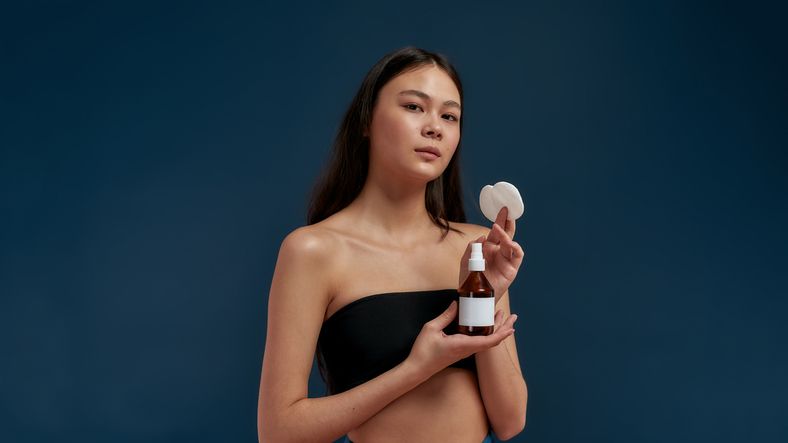
To get rid of hyperpigmentation, it's important to look for items with certain ingredients that are known to brighten and lighten the skin. Some of the ingredients are:
Hydroquinone
Hydroquinone is often found in products that lighten the face. It works by stopping your body from making melanin, which can help lighten dark spots and make your skin tone more even. But you should only use hydroquinone with the help of a dermatologist, since it could have side effects and shouldn't be used for long amounts of time.
Retinoids
Vitamin A is the source of retinoids like retinol and tretinoin, which have been shown to help with acne. They work by speeding up the change of skin cells and making dark spots less noticeable over time.
Vitamin c
Vitamin C is a powerful antioxidant that can help brighten the face and get rid of hyperpigmentation. It stops melanin from being made and helps protect the skin from the damage that UV rays can do to it.
Kojic acid
Kojic acid comes from mushrooms and can make the skin lighter. It works by stopping the enzyme that makes melanin from doing its job. This can help reduce discoloration.
Alpha arbutin
Alpha arbutin is a natural protein that helps even out skin tone and lightens dark spots. It works by stopping an enzyme called tyrosinase from making melanin.
Niacinamide
Niacinamide, which is also called vitamin B3, can help lessen hyperpigmentation by stopping melanin from moving to the surface of the skin. It can also help keep your face healthy by stopping inflammation.
Remember, it's important to choose products with these ingredients in appropriate concentrations and follow a consistent skincare routine!
Read More

3
Lifestyle Changes to Prevent and Manage Hyperpigmentation
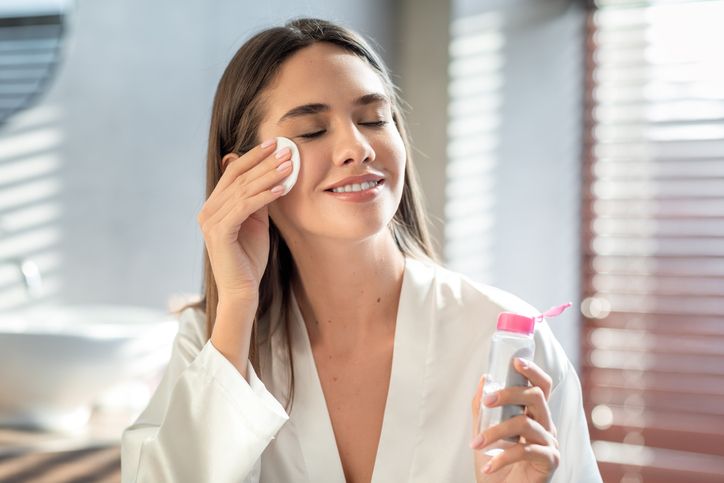
Now that we have ingredients out of the way, we can move on to some steps and treatments to address hyperpigmentation:
Sunscreen
It is very important to protect your face from the sun's harmful rays. Even on cloudy days, use a broad-spectrum sunscreen with a high SPF. This keeps spots from getting darker and makes it less likely that new spots will appear.
Gentle cleansing
Choose a cleaner that is gentle and won't take away the skin's natural oils. Harsh cleaners can make pigmentation problems even worse. To gently exfoliate the face, look for ingredients like glycolic acid or salicylic acid.
Healthy lifestyle
Keeping a healthy lifestyle can help your face in general. A well-balanced diet full of vitamins, regular exercise, enough sleep, and less stress can all help your skin look better.
Professional treatments
If your hyperpigmentation is serious or won't go away, you might want to see a doctor. Chemical peels, microdermabrasion, laser therapy, and cosmetic treatments that need a prescription are some examples.
Brightening serums
Look for serums or treatments that target discoloration in particular. Niacinamide, licorice root extract, and alpha arbutin are all ingredients that can help fade dark spots and make the skin look brighter over time.
Gentle exfoliation
Exfoliating your skin regularly can help get rid of dead skin cells and speed up the turnover of skin cells, which can help reduce pigmentation. But be careful not to scrub too much, because that can hurt the skin. Choose exfoliants that are easy on your skin, like light scrubs or chemical exfoliants with AHAs or BHAs.
Skin-lightening masks
A skin-lightening mask can be added to your beauty routine once or twice a week. Look for masks that contain brightening chemicals like turmeric, papaya enzymes, or clay. Make sure to follow the directions and don't wear the mask for too long to avoid soreness.
Patience and consistency
It takes time for hyperpigmentation to go away, so it's important to be patient and keep up with your makeup routine. Results can vary based on how bad the discoloration is and how your skin reacts to treatments. Stick to a daily schedule and give it some time to see changes.

4
Does Skin Colour Play a Big Role in Hyperpigmentation?
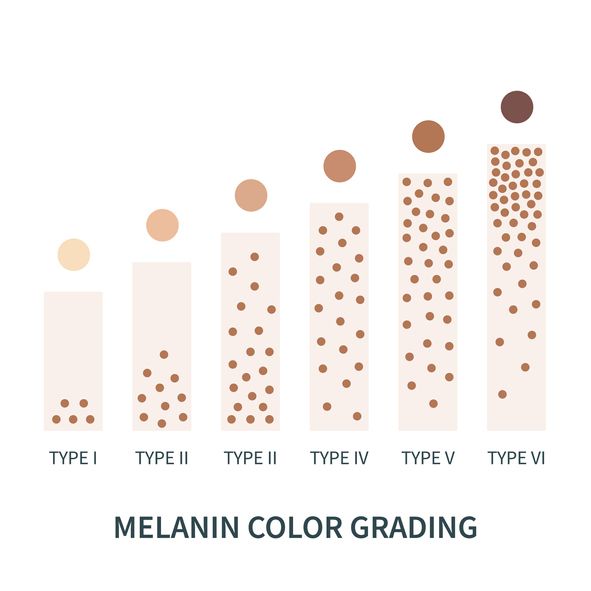
Skin of colour covers people with Fitzpatrick skin types IV through VI, which include people with medium brown, dark brown, and black skin. Hyperpigmentation can look different on people with darker skin tones than on people with lighter skin tones. It may also be more noticeable and harder to treat because of a number of unique reasons.
Increased melanocyte activity is one thing that can cause discoloration in skin of colour. Melanocytes are the cells that are specialised to make melanin. Melanocytes are more active and make more melanin in people with darker skin. This increased activity makes the skin more likely to get hyperpigmentation since even small skin injuries or irritations can cause melanin production to go into overdrive.
Melanosomes are another thing that makes a difference. They are the parts of melanocytes that hold and move melanin. Melanosomes are bigger and more numerous in skin of colour than in lighter skin and larger melanosomes can make it harder to spread them out properly, which can lead to hyperpigmented patches or dark spots.
People with skin of colour are more likely to have certain skin diseases that cause hyperpigmentation. For example, melasma is a common form of hyperpigmentation that causes dark spots on the face, especially on the cheeks, forehead, and upper lip. It's more likely to happen to people with darker skin, and it's often caused by changes in hormones, like pregnancy or taking oral contraceptives.
Treatment for hyperpigmentation in people with skin of colour needs to be careful and individualised. Dermatologists who know how to treat different types of skin can give good advice and suggest treatments that are safe and helpful for darker skin tones and treatments that can cause post-inflammatory hyperpigmentation (PIH) or make hyperpigmentation worse should be avoided. With that, let's go through some intensive treatments to address hyperpigmentation.

Book Now to Experience
Acne Treatment
1 Minute Self-Registration
Date should not be before minimal date

5
Professional Treatments for Hyperpigmentation
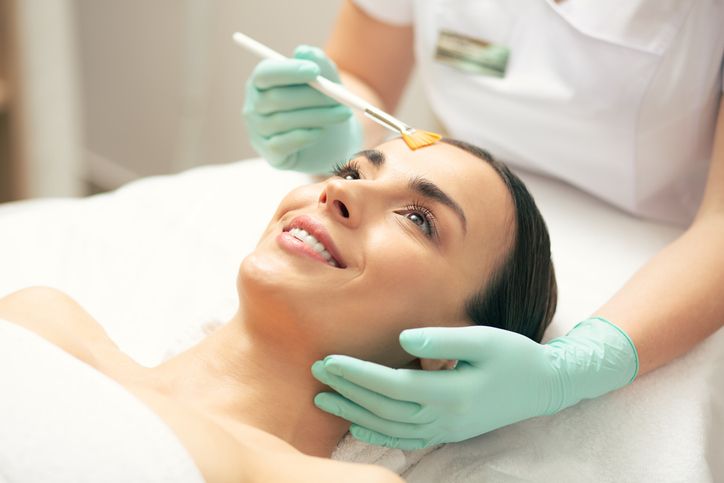
In some cases of serious hyperpigmentation, professional treatments have to be considered. Let's go through some intensive approaches to several professional treatments that are available to address them:
Chemical peels
Chemical peels work well to treat discoloration by removing the top layer of skin with a chemical solution. This process of exfoliation speeds up the change of skin cells and helps fade dark spots and makes the skin tone more even. The depth of the peel can range from light peels that are only a few layers deep to deeper peels that are used for more serious cases and to get the benefits that are wanted, chemical peels often use alpha-hydroxy acids (AHAs), beta-hydroxy acids (BHAs), or trichloroacetic acid (TCA). For better results, it's best to apply for more than one lesson.
Laser therapy
Laser treatments are high-tech methods that can be used to treat hyperpigmentation successfully. People often use intense pulsed light (IPL) and fractional laser rejuvenation. IPL sends out a broad range of light that goes after the melanin in the skin. This breaks down the excess pigment and makes the body make more collagen. With fractional laser resurfacing, precise beams of light are sent to specific places. This helps the skin renew itself and reduces spots.
Microdermabrasion
Microdermabrasion is a non-invasive treatment that uses tiny crystals or a wand with a diamond tip to remove dead skin cells from the face. It gently gets rid of the dead skin cells on the skin's surface, showing fresh, new skin. Microdermabrasion can make hyperpigmentation look better by speeding up cell turnover and getting the body to make more collagen.
Micro needling
For micro needling, a device with small needles is used to make tiny holes in the skin in a controlled way. These tiny holes help the body make more collagen and start the skin's natural mending process. Micro needling can help hyperpigmentation by speeding up the skin's healing process and making dark spots less noticeable. It can be used with platelet-rich plasma (PRP) or topical serums to get better effects.
Prescription-strength topicals
For hyperpigmentation, dermatologists may recommend heavier treatments that you put on the skin. These can have bigger concentrations of ingredients like hydroquinone, retinoids (like tretinoin), or both. These strong formulas help stop the production of melanin, speed up cell turnover, and get rid of dark spots. Because they could have side effects and need to be carefully watched, they should only be used with the help of a doctor or nurse.
Cryotherapy
In cryotherapy, liquid nitrogen is used to freeze and remove the extra melanin in the skin. Most of the time, this treatment choice is used to treat localised areas of hyperpigmentation, and it can work to reduce pigmentation. Cryotherapy may need more than one session, and the area being treated may turn red, swell, or boil temporarily. To get the best results from healing, it's important to take care of yourself properly afterward.

6
Home Remedies and Natural Ingredients for Hyperpigmentation

Professional treatments and medical procedures are good ways to deal with hyperpigmentation, but there are also a number of home remedies and natural ingredients that may help make dark spots look better and even out the skin tone. It's important to remember that results may vary from person to person, and that these treatments should be used carefully and consistently. Here are some popular home treatments and natural ingredients for hyperpigmentation:
Lemon juice
Citric acid, which is found in lemon juice, is a natural way to lighten the skin. Dark spots can be faded by putting fresh lemon juice on them and letting it on for a few minutes before washing it off. But lemon juice can be rough on the skin, so it's important to mix it with water or honey and do a patch test to see if there are any problems. Lemon juice can make you more sensitive to the sun, so it's important to wear sunscreen when you use it.
Aloe vera
Aloe vera gel has qualities that make it soothing and moisturising, and it may help fade hyperpigmentation over time. Pure aloe vera gel from the plant or items with aloe vera in them can help keep the skin moist and speed up the healing process.
Apple cider vinegar
Apple cider vinegar is known for its ability to naturally remove dead skin cells, and it may also help fade acne. If you mix apple cider vinegar with water and use it as a toner or put it on dark spots with a cotton pad, it can help turn over skin cells and make hyperpigmentation look better.
Honey
Honey is a natural humectant and has antibacterial properties. It can be used as a moisturising face mask or combined with other ingredients like lemon juice, aloe vera, or turmeric to create a homemade hyperpigmentation treatment. Honey can help nourish the skin and promote a healthy complexion.
It's important to remember that home remedies and natural ingredients may not work as well as professional treatments or goods with a prescription. Also, some natural ingredients can irritate the skin or cause allergic responses in some people. However, there is another alternative method besides home remedies and professional treatments and that is Acne Treatment by New Beauty!
Read More

7
Unveiling Clear Skin with New Beauty's Acne Treatment

A person's self-esteem can be hurt by acne scars, acne, pimples, whiteheads, and blackheads. Acne treatments have come a long way, and now there are creams, chemical peels, pills, and other ways to treat acne. However, not all of these treatments are long-lasting.
New Beauty's Acne Treatment starts off with dual spiral suction and draining technology that removes dead skin cells and opens up pores at the same time, which calms inflammation and infection caused by acne. Next, a hydrating serum is injected into the face to keep sebum production in check and encourage collagen production. Without too much oil, acne is less likely to come back so take this chance to make your face look better and feel better about yourself!

8
Conclusion
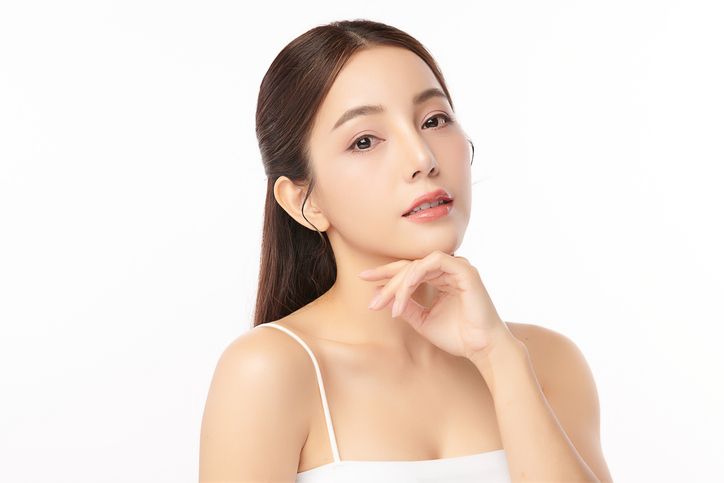
Fighting hyperpigmentation requires using effective goods, making changes to your lifestyle, and, in some cases, getting help from a professional. By knowing what causes hyperpigmentation and using the right treatment for your skin type, you can get rid of dark spots and make your skin tone more even. With New Beauty's Acne Treatment, you can say goodbye to hyperpigmentation and embrace healthier, glowing skin!
FAQ
1. How long does it take to see results from products targeting hyperpigmentation?
Results can vary from person to person and depend on how bad the browning is. Most of the time, it can take a few weeks to a few months of regular use to see improvements.
2. Can hyperpigmentation fade naturally over time?
Mild discoloration can sometimes go away on its own over time, especially if preventative steps are taken and good skin care is kept up. But for more serious cases of hyperpigmentation to get better, it's often necessary to use specific treatments.
3. Can hyperpigmentation be genetic?
Yes, some kinds of discoloration, like melasma, can be caused by genes. If hyperpigmentation runs in your family, you should be extra careful about sun protection and skin care to reduce its affects.
4. Can exfoliation help with hyperpigmentation?
Exfoliation can help treat hyperpigmentation by getting rid of dead skin cells and speeding up the turnover of skin cells. But it's important to use gentle exfoliants and not scrub too much, because doing so can hurt the skin and make hyperpigmentation worse.
5. Are there any specific ingredients to avoid if you have hyperpigmentation?
Some ingredients, like rough scrubs and some essential oils, can make hyperpigmentation worse or make the face irritated. It's best to stay away from these and instead choose products with gentle exfoliants and ingredients that calm the skin.

Book Now to Experience
Acne Treatment
1 Minute Self-Registration
Date should not be before minimal date
Recommended Articles
COPYRIGHT© NEW BEAUTY MANAGEMENT LIMITED 2025. ALL RIGHT RESERVED.




